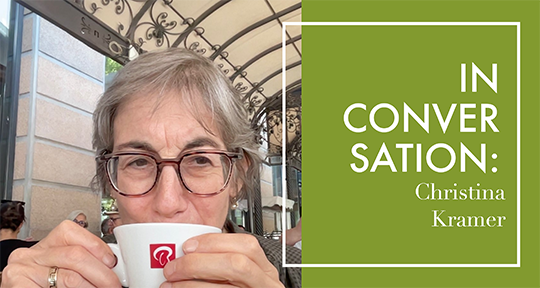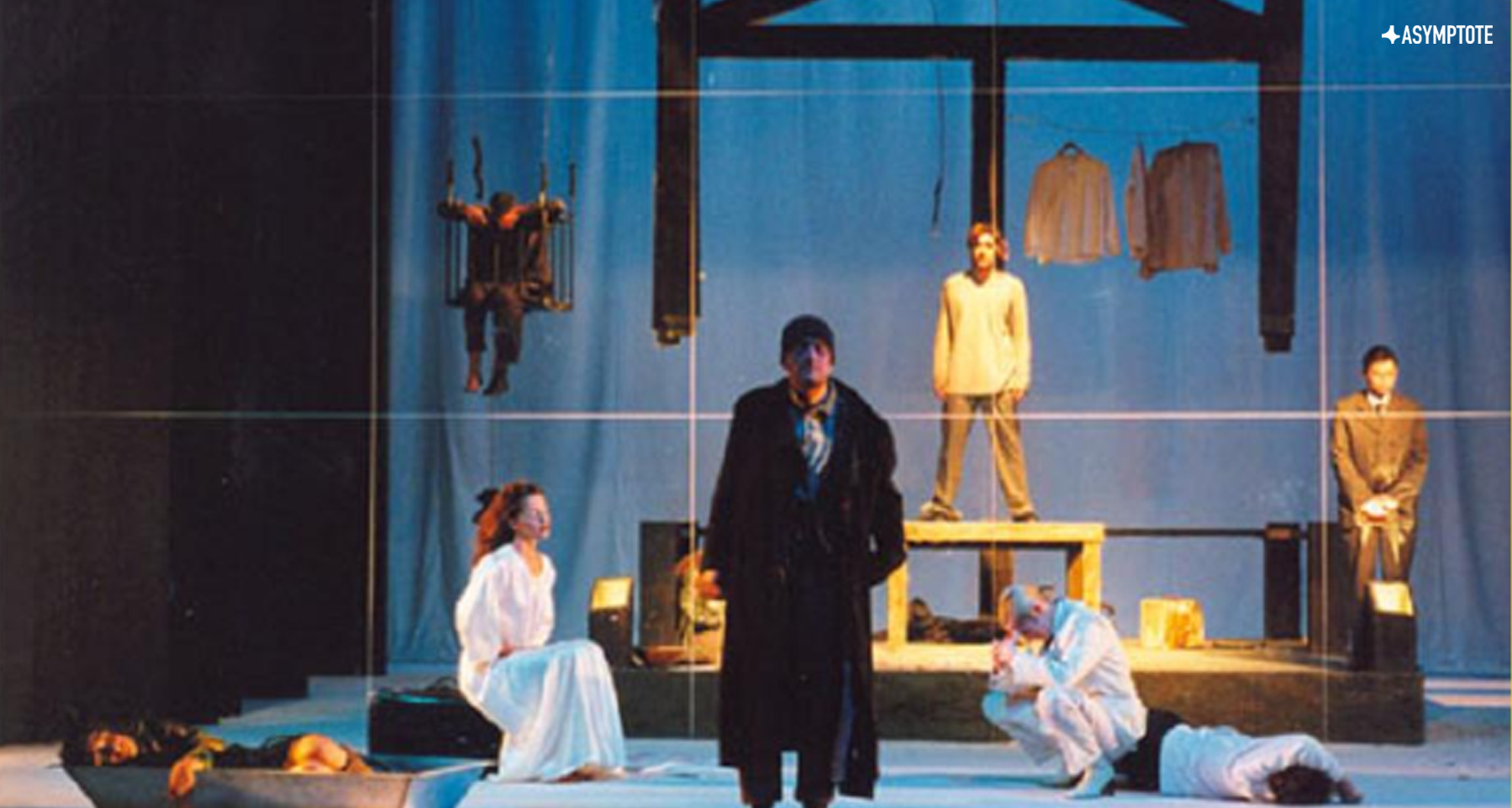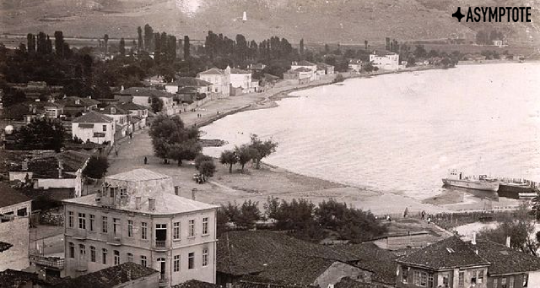The Macedonian playwright Goran Stefanovski, working against the background of ex-Yugoslavia, has long used the microcosm of the theatre to address shifting politics, disintegrating identities, and violence in both physical and spiritual levels. His most well-known work, which encapsulates this lifelong address, is perhaps Divo Meso, an intimate family drama that speaks to the overarching condition of the Macedonian nation, as it is subsumed by invasive forces. In this following essay, Sofija Popovska discusses how the play’s oft-overlooked pathogenic themes dialogue with other texts and narratives from across history, and how, seen along these lines, it speaks universally to the private tragedy of loss, as hidden within the greater global narrative of cultural collisions.
The horseman on the white horse was clad in a showy and barbarous attire. . . While his horse continued galloping, he was bending his bow in order to spread pestilence abroad. At his back swung the brass quiver filled with poisoned arrows, containing the germs of all diseases.
—Vicente Blasco Ibáñez, The Four Horsemen of the Apocalypse
In Scene VIII of Goran Stefanovski’s 1979 theatrical piece, Divo Meso, a destitute Macedonian household is paid a visit by a German investor, who offers to buy their house in order to have it remodeled into a showroom. Upon his arrival, Maria, the mother of the family, plunges into reverie, ruminating about a mythical condition she’s certain she’s plagued by: the eponymous divo meso. It is, we are told, an “old wives’ tale”—flesh which forms around a hair inside the throat, and grows until its victim asphyxiates. Despite its superstitious roots, Maria’s fear sublimates the intuition of a condition more cataclysmic and widespread: the body of Macedonian society, weakened by discord and poverty, being infiltrated by foreign interests as if by a pathogen. Transformed into an eschatological growth, the will of their German visitor continues its indomitable conquest throughout the play, leading the family to a coda marked by desolation, surrender, and powerless rage.
Though indicated by the title, the element of illness in Divo Meso hasn’t been explored much, relegated to the background in favor of discussing the loss of tradition. Regardless, the pathogen metaphor is especially apt at describing imperialist intervention into cultures; rather than cultivating a mutualistic or commensalistic relationship between two consenting cultures, it introduces a drastically one-sided power dynamic, to the profit of one and the undoing of another. However, before we delve further into the specificities of Divo Meso, I would like to invite you to consider two episodes, one historical and one literary, that tell stories of cultural contagion. These will help unravel the pathogen-host relationship in its cultural, imperialist context, and illuminate individual processes that comprise it—such as the transformation of identity into a collision site of imposed, internalized, and inherent traits. Rather than the reductive (albeit also valid) reading of Divo Meso as a tragedy of familial and national scope, a simultaneous reading of the following tragic—and in many ways analogous—texts will allow for a richer understanding of the theatrical piece, one that includes transcultural motifs.
On June 23, 1763, trader and land speculator William Trent recorded in his diary that two Native American diplomats had arrived at Fort Pitt in order to persuade the British to abandon the location. After negotiations failed, the British offered the Delaware emissaries a parting gift. “Out of our regard to them we gave them two Blankets and a Handkerchief out of the Small Pox Hospital. I hope it will have the desired effect,” wrote Trent. It remains unknown whether this instance of biological warfare succeeded, though the Native American population around Fort Pitt was “struck hard” by smallpox in the spring and summer of 1763. This wasn’t the first, nor last tale of contamination to be found in the imperialist trajectories of Western Europeans. Engraved upon traditions, echoing through languages, and rising scar-like from the surface of collective memory, the image of Western Europe as a cataclysmic pathogen becomes a motif, repeated unto the ages of ages. READ MORE…










Blog Editors’ Highlights: Winter 2025
Reviewing the manifold interpretations and curiosities in our Winter 2025 issue.
In a new issue spanning thirty-two countries and twenty languages, the array of literary offers include textual experiments, ever-novel takes on the craft of translation, and profound works that relate to the present moment in both necessary and unexpected ways. Here, our blog editors point to the works that most moved them.
Introducing his translation of Franz Kafka’s The Trial in 2012, Breon Mitchell remarked that with every generation, there seems to be a need for a new translation of so-called classic works of literature. His iteration was radically adherent to the original manuscript of The Trial, which was diligently kept under lock and key until the mid-fifties; by then, it was discovered exactly to what extent Max Brod had rewritten and restructured the original looseleaf pages of Kafka’s original draft. It is clear from Mitchell’s note that he considers this edit, if not an offense to Kafka, an offense to the reader who has lost the opportunity to enact their own radical interpretation of the work: an interpretation that touched Mitchell so deeply, he then endeavored to recreate it for others.
In Asymptote’s Winter 2025 Issue, the (digital) pages are an array of surprising turns of phrase and intriguing structures—of literature that challenges what we believe to be literature, translations that challenge what we believe to be originality, and essays that challenge what we believe to be logic. I am always drawn to the latter: to criticism, and writing about writers. As such, this issue has been a treat.
With the hundredth anniversary of Kafka’s death just in the rearview and the hundredth anniversary of the publication of The Trial looming ever closer, the writer-turned-adjective has not escaped the interest of Asymptote contributors. Italian writer Giorgio Fontana, in Howard Curtis’s tight translation, holds a love for Kafka much like Breon Mitchell. In an excerpt from his book Kafka: A World of Truth, Fontana discusses how we, as readers, repossess the works of Kafka, molding them into something more simplistic or abstract than they are. In a convincing argument, he writes: “The defining characteristic of genius is . . . the possession of a secret that the poet has no ability to express.” READ MORE…
Contributors:- Bella Creel
, - Meghan Racklin
, - Xiao Yue Shan
; Languages: - French
, - German
, - Italian
, - Macedonian
, - Spanish
; Places: - Chile
, - France
, - Italy
, - Macedonia
, - Switzerland
, - Taiwan
, - Turkey
; Writers: - Agustín Fernández Mallo
, - Damion Searls
, - Elsa Gribinski
, - Giorgio Fontana
, - Lidija Dimkovska
, - Sedef Ecer
; Tags: - dystopian thinking
, - identity
, - interpretation
, - nationality
, - painting
, - political commentary
, - revolution
, - the Cypriot Question
, - the Macedonian Question
, - translation
, - visual art
, - Winter 2025 issue
, - world literature